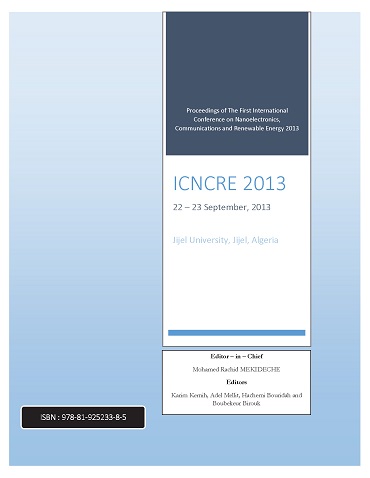- Publication Meta:Value
- Short Title:ICNCRE 2013
- Publisher:ASDF, India
- ISBN 13:978-81-925233-8-5
- ISBN 10:81-925233-8-1
- Language:English
- Type:Hard Bound - Printed Book
- Copyrights:[email protected]
- Editor-in-Chief:Mohamed Rachid Mekideche
- Conference Dates:22 - 23, September 2013
- Venue Country:Jijel, Algeria
- Submitted Papers:477
- Acceptance Rate:21.17%
- Website:www.asdf.org.in
Welcome to ASDF Electronic Digital Library!
ICNCRE 2013
ICNCRE 2013
International Conference on Nanoelectronics, Communications and Renewable Energy 2013
Paper 002
Substrate Type Effect on Boron Doped Polysilicon Films Properties
Adel Kemiha1, Boubekeur Birouk2, Messaoud Boukezzata3
1Faculty of Sciences and Technology, University of Jijel
2Electronics Department, University of Constantine
Abstract
In this work, we studied the effect of substrate type on structural and electrical properties of heavily in situ Boron doped polycrystalline silicon. The films have been elaborated by LPCVD technique, on monocrystalline silicon substrate oriented (111), oxidized or bare, at deposition temperature 585 C and pressure of 700 mtorr. From the XRD spectra, it can be seen that the polycrystallized films BLPCVD/SiO2 possess (111) textured columnar grains, meanwhile the film deposited on bare monosilicon (BLPCVD/c-Si) is randomly oriented, although weakly, (111),(222) and (511) textures. The FTIR spectroscopy analysisreveals changes in chemical bonding structure which is constituted of different bonds as: Si-Si, Si-O-Si, Si-O, Si-H, Si-OH and Si2O3. Overall, the associated intensity and wave number depend on the substrate type. The characterization by Hall effect shows that the resistivity is two times more weakly for B-LPCVD/SiO2 films than for B-LPCVD/c-Si ones. In the other hand, the results pointed out a typical electrical behavior of the layers linked to intermediate oxide layer. The resistivity decreases greatly at low temperatures in c-Si substrate case, however this occurs at high temperatures in SiO2 substrate case.
Keywords
Author's Profile
Author profile can be generated and linked through our partners World Book of Researchers. To include your profile online Click Here. After it is approved, please email to edlib @ asdf.res.in to create a link with all the papers.
e-AID
ICNCRE.2013.002
Cite this Article as Follows
Adel Kemiha, Boubekeur Birouk, Messaoud Boukezzata. Substrate Type Effect on Boron Doped Polysilicon Films Properties. International Conference on Nanoelectronics, Communications and Renewable Energy 2013. Vol. 1. Chennai: Association of Scientists, Developers and Faculties, 2013. 05-09. Print.
© 2010 - by EDLIB .
All Rights Reserved.

